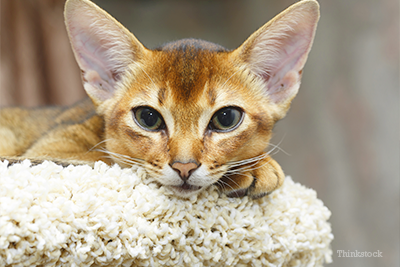
Proteinuria is defined as the presence of excess protein in the urine. Cats can normally have a trace amount of protein in their urine. This represents small protein particles, those tiny enough to pass through the pores of the glomeruli (the kidney’s microscopic filtration units). The glomeruli prevent albumin and other larger protein particles from entering the urine.
The discovery of excessive protein in a cat’s urine warrants investigation to identify the underlying cause. The earlier the cause of the proteinuria is treated, the greater the likelihood of a positive outcome.
Causes of proteinuria in cats
Potential sources of excessive protein within the urine include all of the different structures within the urinary tract. The protein can also originate from portions of the reproductive tract that are anatomically connected to the urinary tract (prostate gland, uterus and vagina). Sampling the urine directly from the urinary bladder with a needle (cystocentesis) can help reduce contamination as the urine passes out of the body.
The most common causes of proteinuria include:
- Infection
- Inflammation such as that caused by feline interstitial cystitis, stones, polyps or tumors
- Bleeding
- Glomerular disease
- Too much protein within the bloodstream (hemoglobin, globulin, myoglobin, immunoglobulin) resulting in excess protein filtered into the urine
Symptoms of proteinuria in cats
In and of itself, proteinuria does not cause any symptoms. When symptoms do arise, they are typically as a result of the underlying cause of this disorder. For example, when proteinuria is caused by a cystitis (inflammation of the bladder wall), symptoms commonly include:
Increased frequency of urination
Straining to urinate/inability to urinate
Blood within the urine
Proteinuria caused by glomerular disease is often associated with chronic kidney disease. The following symptoms may be observed when chronic kidney disease is advanced:
- Loss of appetite
- Lethargy/weakness
- Vomiting
- Increased thirst and urine output
Diagnosis of proteinuria in cats
The first step is documentation of proteinuria. This begins with the urinalysis. On appropriate urine samples, the amount of protein lost will be measured using a combination of the tests recommended by your veterinarian.
When honing in on the underlying cause of the proteinuria, in addition to a thorough physical examination, diagnostic steps may include:
- Complete blood cell count (CBC)
- Blood chemistry profile
- Urine culture
- Abdominal ultrasound
- Blood pressure measurement
- Infectious disease testing
A clear-cut diagnosis of glomerular disease requires a kidney biopsy. This can be accomplished via surgery, laparoscopy, or with ultrasound guidance. Whichever method is used, collection of a kidney biopsy has the potential to cause significant complications. Thoughtful discussion with a veterinarian about risks and benefits should always precede a kidney biopsy. Click here to learn more about glomerular disease.
Treatment and prognosis of proteinuria in cats
Both the treatment of proteinuria and prognosis associated with this disorder vary enormously depending on the underlying cause. For example, an infection within the lower urinary tract typically resolves with a course of antibiotics and the prognosis is excellent. Some cats with glomerular disease respond favorably to treatment while others do not. The long-term prognosis for a cancerous process within the urinary tract is usually quite poor.
Should your cat be screened for proteinuria?
Even if your cat appears completely healthy, screening for proteinuria makes good sense in the following situations:
- Your cat is middle-aged or older, in which case testing the urine should be part of annual health screening.
- Your cat’s breed is one that is predisposed to an inherited form of glomerular disease. This includes Abyssinians, Orientals and Siamese.
Questions to ask your veterinarian
- What is the cause of my cat’s proteinuria?
- What are the treatment options?
- What is the prognosis?
- How will my cat be monitored on an ongoing basis?
If you have any questions or concerns, you should always visit or call your veterinarian -- they are your best resource to ensure the health and well-being of your pets.
